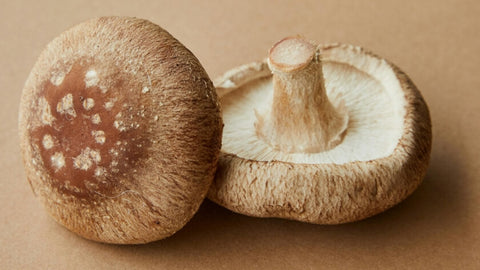Key points you need to know |
| Symptoms Vary: Shiitake mushroom reactions range from mild (itchy skin, stomach upset) to severe (breathing trouble). Any concerning symptom after eating them warrants medical attention. |
| Testing is Key: Don’t just assume it’s a Shiitake allergy. Our food intolerance tests can help identify an intolerance as the cause instead. |
|
Symptoms to Watch For: If you suspect a Shiitake mushroom problem, look for these signs after eating them:
|
A shiitake mushroom allergy is when you experience symptoms after eating shiitake mushrooms or food containing shiitake mushrooms. Symptoms can be unpleasant, ranging from itchy skin to stomach pain. Serious allergies can cause breathing difficulties or anaphylaxis, but thankfully this is rare. In this post, we’re going to explore the signs and symptoms of shiitake mushroom allergies, how common they are, and what food to avoid if you suspect you suffer from one.
Can you actually be allergic to shiitake mushrooms? Yes, although food allergies are more commonly associated with foods like nuts, shellfish, and dairy, it is possible to have an allergic reaction to shiitake mushrooms. The immune system mistakenly identifies certain proteins in shiitake mushrooms as harmful, triggering an allergic reaction.
How common is this allergy? While exact statistics on shiitake mushroom allergy are not readily available, it is considered less common than allergies to foods like peanuts or shellfish. However, those who do have a sensitivity or allergy to mushrooms may experience symptoms ranging from mild to severe.
Signs & Symptoms of a Shiitake Mushroom Intolerance or Allergy
What are the symptoms of a shiitake mushroom allergy?
Like other food allergies, symptoms of a shiitake mushroom allergy can vary but may include:
- Nausea, sickness, or diarrhoea
- Hives, a rash, or itchy skin
- Abdominal pain and cramps
- Breathing difficulties or tightening of the throat
- Pale or discoloured skin
- Lightheadedness or dizziness
Anaphylaxis is a severe but rare reaction to shiitake mushrooms. Immediate medical attention is required if symptoms like throat tightening, a severe drop in blood pressure, rapid pulse, or loss of consciousness occur.
What are the symptoms of a shiitake mushroom intolerance?
Intolerance symptoms, unlike those of an allergic reaction, are generally less severe and may include:
- Stomach or intestinal pain
- Bloating
- Constipation or diarrhoea
- Fatigue
What is food intolerance?
Food intolerance occurs when the body struggles to digest a particular food. This condition does not involve the immune system and results from difficulty metabolising certain compounds in food. Though not as severe as allergies, intolerances can still cause significant discomfort.
How common is a shiitake mushroom intolerance?
Data on the prevalence of shiitake mushroom intolerance specifically is scarce, as food intolerances can vary widely among individuals and are less frequently diagnosed compared to allergies. However, individuals may develop intolerances to a variety of foods, including mushrooms, based on their body’s ability to process certain substances.
Study Findings on Shiitake Mushroom Allergy
Recent studies at the University of Navarra, Pamplona, Spain, have highlighted unique allergic reactions to shiitake mushrooms, moving beyond common skin irritations to include gastrointestinal symptoms:
- Increased Reports: As shiitake mushrooms gain global popularity, adverse reactions are more frequently reported.
- Common Reactions: Skin irritation similar to eczema is typical, especially from raw or undercooked mushrooms.
- Occupational Hazards: Workers involved in mushroom cultivation face risks of dermatitis and respiratory issues.
- Gastrointestinal Symptoms: A rare case detailed esophageal discomfort following shiitake consumption, confirmed by tests like skin prick, BAT, and HRT, pointing to a direct food allergy.
How do you test for a shiitake mushroom allergy or intolerance?
If you suspect an allergy or intolerance to shiitake mushrooms, consider the following steps:
- Consult a doctor: A healthcare professional can provide advice based on your symptoms, medical history, and dietary habits.
- Food diary: Keep track of what you eat and any symptoms that follow. This can help identify patterns related to shiitake mushroom consumption.
- Elimination diet: Temporarily remove shiitake mushrooms from your diet to see if symptoms improve.
- Food intolerance test: Consider undergoing a test to identify specific food intolerances, including shiitake mushrooms.
What should you do if you think you have a shiitake mushroom allergy or intolerance?
If you experience symptoms associated with a shiitake mushroom allergy or intolerance, eliminating shiitake mushrooms from your diet and consulting with a healthcare provider for a proper diagnosis is advisable. It’s crucial not to self-diagnose, as professional testing and consultation can provide a definitive answer.
What foods should you avoid if you have a shiitake mushroom allergy or intolerance?
If you’ve been diagnosed with a shiitake mushroom allergy or intolerance, or if you suspect you might have one, it’s important to be vigilant about the foods you consume. Shiitake mushrooms can be found in a variety of dishes, especially in Asian cuisine. Here are some foods and products you might want to avoid:
- Dishes containing shiitake mushrooms directly, such as in soups, stir-fries, and broths.
- Processed foods that may contain mushroom extracts as flavourings or additives.
- Vegetarian or vegan meat substitutes, which often use mushrooms for their meaty texture and flavour.
- Certain sauces and gravies that use mushrooms or mushroom stock.
Reading labels carefully and asking about ingredients when eating out can help you avoid shiitake mushrooms. If you’re unsure whether a product or dish contains shiitake mushrooms, it’s best to err on the side of caution and choose something else.
10 alternatives to shiitake mushrooms
If you love the texture and depth of flavour that shiitake mushrooms add to your meals but need to avoid them, consider these alternatives:
- Portobello mushrooms – offer a meaty texture suitable for grilling and roasting.
- Button mushrooms – easily found and versatile for many dishes.
- Cremini mushrooms – similar in taste to shiitake but less likely to cause allergies.
- Oyster mushrooms – provide a similar umami flavour and can be used in stir-fries or soups.
- Eggplant – when cooked, offers a texture that can mimic mushrooms in stews and sauces.
- Zucchini – has a mild flavour and can absorb the tastes of dishes well, similar to mushrooms.
- Tofu – a great protein substitute that can take on the flavour of dishes it’s cooked with.
- Tempeh – offers a nutty flavour and can be marinated to enhance dishes.
- Seitan – wheat gluten that provides a chewy, meat-like texture suitable for many recipes.
- Chickpeas – can be roasted or sautéed for added texture and protein in meals.
How to test if you have a shiitake mushroom allergy or intolerance
Identifying an allergy or intolerance can significantly improve your quality of life by helping you avoid triggers and manage symptoms more effectively. As mentioned, consulting a healthcare professional, keeping a detailed food diary, trying an elimination diet, and undergoing testing can all help in diagnosing a shiitake mushroom allergy or intolerance.
For those interested in testing for food intolerances or allergies, including to mushrooms, we offer comprehensive tests that can identify sensitivities to a wide range of foods. Discovering your triggers can be the first step towards a more comfortable and symptom-free life.
Frequently Asked Questions (FAQ)
Can cooking shiitake mushrooms reduce the risk of allergy?
Cooking can alter the proteins in foods that cause allergic reactions in some cases. However, if you have a known allergy to shiitake mushrooms, it’s safest to avoid them entirely, as cooking may not eliminate the allergen.
Are shiitake mushroom allergies permanent?
Food allergies can change over time. While some people may outgrow certain food allergies, others may find their allergies persist into adulthood. Regular check-ups with an allergist can help monitor any changes in your allergy status.
Can I be allergic to shiitake mushrooms but not other types of mushrooms?
Yes, it’s possible to be allergic to one type of mushroom and not others, due to specific proteins that may not be present across all mushroom varieties. However, caution is advised when trying other mushrooms if you have a known shiitake mushroom allergy.
What should I do if I accidentally consume shiitake mushrooms?
If you have a shiitake mushroom allergy and accidentally consume them, monitor your symptoms closely. For mild reactions, over-the-counter antihistamines may help. For severe reactions or symptoms of anaphylaxis, seek emergency medical attention immediately.
Are there any nutritional deficiencies I should be aware of if avoiding shiitake mushrooms?
Shiitake mushrooms are a good source of vitamins and minerals, but they can be replaced with other foods. Ensuring a balanced diet with a variety of fruits, vegetables, grains, and proteins can help prevent nutritional deficiencies.











